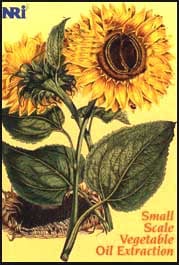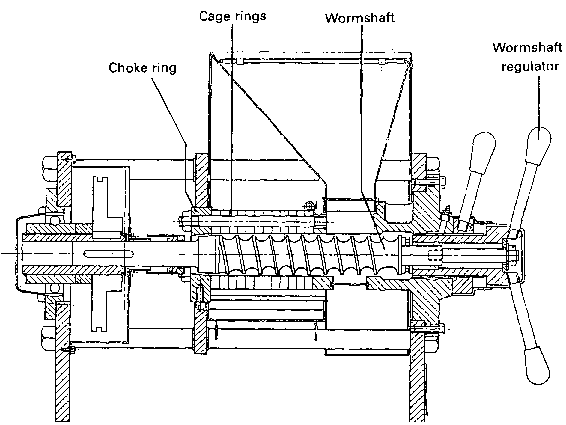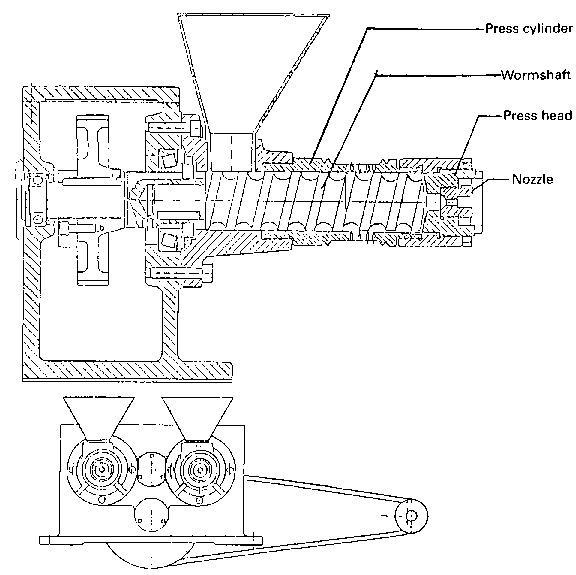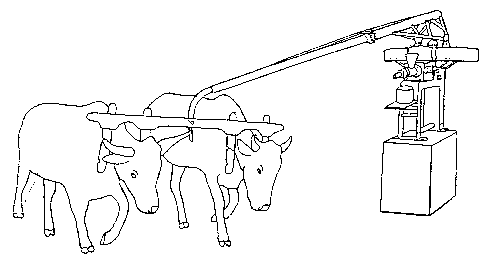
Appendix 2 - Sources of Equipment[edit | edit source]
Decortication and winnowing
Known sources of equipment for the decortication of sunflower seeds, groundnuts and palm kernels are listed below.
Sunflower seed
Tinytech Plants, India. Decorticator, capacity 300 kg/in with 2 hp electric motor. Price US.
UNATA, Belgium. Decortication in a hammer mill followed by husk separation in a winnower. The prices of the hammer mill and winnower are 61000 and 28000 Bfrs, respectively. The equipment is hand driven but can be motorized if required.
CeCoCo, Japan. This company manufactures equipment for decorticating and winnowing sunflower seed in both manual and powered versions.
Groundnuts
Alvan Blanch, UK. This company offers a manually operated decorticator with a throughput of 100 kg/in in kit form priced at £150. A manually operated machine with an inbuilt winnower having a throughput of 150 kg/ h costs £1140; this can also be supplied powered by an electric motor or diesel engine.
SPF, India. This company manufactures three powered groundnut decorticators, the smallest having a capacity of 20 bags of undecorticated seed/in.
Tinytech Plants, India. Groundnut decorticator, capacity 350 kg/in with inbuilt blower to remove husks, grade kernels and split kernels. Price US without motor.
UNATA, Belgium. This company manufactures a groundnut decorticator and a separate winnower costing 32000 and 28000 Bfrs, respectively. The equipment is hand driven but can be motorized if required.
CeCoCo, Japan. This company manufactures machines for decorticating and winnowing groundnuts in both manual and powered versions.
Palm kernels
Alvan Blanch, UK. A range of palm nut crackers and separators can be supplied. The smallest machine, which is hand operated, has a capacity of 120 kg/in and costs £ 1280.
Tinytech Plants, India. Decorticator, capacity 300 kg/in with 2 hp electric motor. Price US.
UNATA, Belgium. UNATA use their hammer mill (priced at 61000 Bfs) to achieve decortication. The mill is hand driven but can be motorized if required.
General SPEC, India, manufacture three decorticators, the smallest of which is priced at US (excluding motor).
Seed cleaning
Seed cleaning at a small-scale level is usually carried out manually either by winnowing or sieving. The importance of this operation prior to expelling is again stressed, especially in relation to sunflower seed and sesame processing.
Size reduction
Alvan Blanch, UK. The company manufactures a wide range of hammer mills with options of drive by electric motor, diesel engine, petrol engine and tractor. The smallest model, the 'Merrymill' is priced at around £ 1100. Alvan Blanch also make vertical steel plate mills, the smallest of which costs £ 98 hand operated, or £ 235 powered by a single-phased 0.37 kW electric motor.
Christy Hunt, UK. This company manufactures the 'Christy Norris' range of hammer mills and the 'Atlas' and 'Premier' range of small-scale manual and powered disc mills.
CeCoCo, Japan. The company manufactures three 'seed crushers' which operate on the hammer mill principle. Seed throughput ranges from 300 to 1000 kg/in.
Ecirtec, Brazil. Ecirtec manufactures a small hammer mill with a seed throughput of around 60-80 kg/in. The cost of this mill is US.
IBG Monfords Gmbh & Co., Germany. IBG Monfords manufacture the 'Komet' cutting machine which is designed to operate on a range of oilseeds including copra and palm kernels. The mill contains two serrated cutting wheels which rotate at different speeds giving a cutting action The 'ax-works' cost of this machine, complete with 1.1 kW three-phase motor, is DM 6315.
Laxmi Vijay Brass & Iron Works, India. This company makes two disc mills which are suitable for grinding small seeds and oilseed cakes.
Miracle Mills Ltd, UK. This company's 100 Series hammer mills are suitable for most small-scale applications.
MRN, Germany. MRN fabricates a small crusher suitable for copra and palm kernels. Power is supplied by a 2.2 kW electric motor.
SPEC, India. The company offers a choice of three copra cutters and five disintegrators. The smallest copra cutter is priced at US.
SPF, India. The company manufactures two copra cutters which operate on the hammer mill principle. The smaller version has a capacity of 1 t/in.
The Rex Trading Co., India. This company manufactures a range of disintegrators, some of which are suited to small-scale operation.
Tinytech Plants, India. Tinytech manufacture a small hammer mill with a capacity, using copra, of 300 kg/in. The cost of this machine is US.
UNATA, Belgium. UNATA market a general-purpose, manually-operated machine that operates both as a hammer mill and a decorticator for palm nuts. When grinding palm kernels, the throughput is 20 kg kernels/in. The machine in its hand-driven version costs 61500 Bfrs.
Rolling
UNATA, Belgium. UNATA recommend rolling oilseeds to produce flakes in their processing systems. The cost of the machine in its hand-driven version is 53000 Bfrs.
Conditioning
CeCoCo, Japan. This company manufactures three seed 'scorchers' which may be built into a hearth and heated by firewood or oil.
Ecirtec, Brazil. Ecirtec manufactures a seed conditioner similar in construction to the CeCoCo 'scorcher'. The cost of this unit is US.
UNATA, Belgium. UNATA can supply parts and plans for the construction of a heating oven which can heat seed to a temperature of about 85°C in about
20 min. Heating capacity matches the capacity of the UNATA bridge press. The cost of the basic parts for this oven is 24000 Bfrs.
Note on conditioners for expellers. Some manufacturers of small expellers can fit steam-heated conditioning kettles. These include Ludhiana Expeller Ind., India and Tinytech Plants, India. MRN, Germany, fabricate a conditioner which can be heated by steam, electricity, light fuel oil or diesel.
Manual presses
Plank press
ITDI, Philippines. This organization has described the use of a plank press for the extraction of coconut milk from freshly-grated coconut.
Bridge-type presses
Agricultural Engineers Ltd, Ghana. This company manufactures a manually-operated press suitable for palm oil processing.
Alvan Blanch, UK. This company manufactures a bridge press which is suitable for general oilseed processing. The cost of the press is £ 850.
Anglesey Hydraulics, UK. This company manufactures a heavy-duty hydraulic press with a 45 l cage. The maximum pressure applied to the seed is 54 kg/cm². The press is supplied with three cages. While one cage is being pressed, the second cage containing pressed material can be emptied, while the third cage is reloaded.
000, The Netherlands. DDD manufactures and sells an 81 capacity 'spindle' press designed by KIT which costs 1940 FL. The press is equipped with a steel 'spindle' which turns in a cast-iron nut, and the frame is constructed from sheet metal. As the weight of this press is only 60 kg, it can easily be transported on a bicycle (as being practiced in Casamance). The maximum attainable pressure is 40 kg/cm². The capacity of the press is half that of the UNATA press.
NRI, UK. NRI can supply the plans of a bridge press. The cost of building this press in the UK is estimated at £ 1000. A recent cost estimate obtained in the Solomon Islands was £ 660 for a single press or £ 550 for one of a production run of six. The cost can be considerably reduced if the construction is adapted to allow fabrication from locally-available materials.
TDAU, Zambia. TDAU manufactures a simple bridge press which costs US. The capacity is quoted at 50 kg/day (for sunflower seed or groundnuts), yielding 6-8 l of oil.
UNATA, Belgium. This press, which is at the centre of all UNATA's processing methods, is priced at 45000 Bfrs. This normal version has a 17 l cage which is manufactured in two forms depending on the type of seed being processed. For palm fruit, the cage has 6 mm oil drainage holes, while for other seeds, the hole size is reduced to 2 mm.
Ram press
ApproTEC, Kenya. This organization has developed a ram press which is claimed to be ergonomically correct.
CAMARTEC, Tanzania. CAMARTEC manufacture a small version of the ram press termed the BP-30. This machine is priced at about 40000 TSh.
CAPU, Tanzania. CAPU have several workshops in Tanzania which manufacture this version of the ram press. The machine costs about 100000 TSh.
TDAU, Zambia. This organization has developed a stronger version of the Bielenburg press which is reported to be suitable for processing the common type of locally-grown sunflower seed with a thick shell. The press can be purchased at TDAU and other Zambian manufacturers.
Ghani
The Rex Trading Co., India. This company manufactures a rotary oil mill which can be powered either by an electric motor or a diesel engine.
Tinytech, India. This company can supply a power ghani with a seed throughput of 12 kg/45 min. The ghani is powered by a 2 hp single-phase electric motor.
Expellers
Capacity of small expellers A small expeller is regarded in this manual as being capable of processing oilseeds within the range of 15 to 100 kg/in.
Agricultural Engineers Ltd, Ghana. This company is known to manufacture an expeller but no details are available.
Alvan Blanch, UK. This company manufactures an expeller which operates on the same principle as the Mini 40 expeller, but is called the Mini 50. Power is supplied through a 5.5 kW electric motor or a diesel engine. The cost of the electrically-powered Mini 50 is £ 3695, while the f.o.b. cost of a spares kit containing a wormshaft, set of cage rings, a choke ring and other items, is £ 1154. The cost of the diesel-powered version and spares kit is £ 4195 and £ 1208, respectively.
Anderson International Corporation, US. Anderson have recently introduced a new expeller called the Lion-90. The capacity of this machine is 45-180 kg/in, depending on the seed.
BAR N. A., Incorporated, US. This company markets several small-scale systems to extract oil mechanically from soyabeans and process the soyacake further into low cost human foods. Extrusion cooking equipment is used in the extraction system before expelling.
Bismillah Machinery Store, Pakistan. The New Lahore expeller has a rapeseed throughput of around 65 kg/in. It is powered by a 7.5 kW motor and is used widely in Pakistan. There are many companies manufacturing similar designs to this expeller.
CeCoCo, Japan. CeCoCo manufactures an extensive range of small-scale processing equipment including four expellers. These expellers have throughputs of between 30 kg/in and 130 kg/in.
The smallest expeller (see Figure 13) in the range is the Type 52. It has a nominal capacity of 30-50 kg seed/in and is powered by a 2.2 kW electric motor. The cost of this expeller (c.i.f., Amsterdam) is US; this includes standard spare parts (comprising one wormshaft, a set of cage bars and two taper rings) for 600-800 h running. The cost of spare parts for two years of operation (4800 h running) is assessed by the company as follows:
|
6 wormshafts |
@ US each |
US |
|
6 cage bar sets |
@ US each |
US |
|
12 taper rings |
@ US each |
US |
The exact requirement for spare parts will depend both on the nature of the seed and its method of preparation.
The next size up is the Type M which processes 50-80 kg seed/in. It is fitted with a cake-breaking device and is powered by a 3.7 kW electric motor.
The Type H-54 is able to process 80-100 kg seed/in and is powered by a 7.5 kW electric motor.
CeCoCo's Type EX-100 expeller is capable of processing 100-130 kg seed/in. This expeller is also powered by a 7.5 kW motor.
All the above expellers can be operated using diesel engines as well as electric motors. The barrels of CeCoCo expellers consists of steel bars assembled axially in line with the wormshaft. Cake is discharged as flakes. The wormshafts of the larger CeCoCo expellers are manufactured with removable flights so that when the end becomes worn after extended use, only that portion needs to be replaced and not the complete wormshaft.
De Smet Rosedowns, UK. This manufacturer makes the Mini 40 expeller (see Figure 18) which has a throughput of 15-60 kg/in depending on the oilseed being processed.
The Mini 40 barrel consists of 12 cast-iron rings arranged to fit on three bars running parallel to the wormshaft to form a barrel through which the wormshaft rotates. Spacer shims fit onto the bars and between each ring to form gaps through which the expelled oil is discharged. The size of the shims is adjusted to suit the seed being processed. The wormshaft supplied with the Mini 40 is of a single-piece construction. When this item becomes worn, the whole wormshaft needs to be replaced. The unit can be powered by a 4 kW electric motor or a 6.6 kW diesel engine. The electrically-powered version is fitted with an electromagnetic vibratory feeder.
Figure 18 Outline drawing of the De Smet Rosedown Mini 40 small-scale expeller
Current prices vary from about £ 6900 for the electric Mini 40 and £ 8500 for the diesel-powered unit. The cost of wear parts is as follows:
|
Wormshaft |
£ 464 |
|
Set of cage rings |
£ 321 |
|
Choke ring |
£ 64 |
Ecirtec, Brazil. Ecirtec has developed a small-scale expeller similar in design to the De Smet Rosedown Mini 40. The expeller is powered by a 3 kW electric motor through a helical wormgear providing a wormshaft speed of 70 r.p.m.
The price of the press is US, while a complete set of wear parts (wormshaft, cage rings and choke ring) is US. These prices are f.o.b. Santos.
Essential Products, Bangladesh. This company makes an inexpensive expeller designed to process rapeseed/mustardseed.
FAKT, Germany. FAKT is a German consulting firm which has developed an expeller for GTZ in close collaboration with Development and Consulting Services in Butal, Nepal, and Tinytech Ltd, Rajkot, India. The expeller, called the Sundhara, has a capacity of 30-40 kg seed/in. One of the key objectives in the development of the Sundhara expeller was the creation of a design which could be manufactured in reasonably well-equipped workshops in developing countries. The press can be obtained from a manufacturer in Germany for DM 17000 (enquiries through FAKT). FAKT is presently assisting the development of manufacturing facilities in Nepal and India where the price will be .
Figure 19 Outline drawing of an IBG Monforts and Reiners small-scale 'Komet' expeller
IBG Monforts & Reiners GmbH & Co. This company manufactures the Komet spindle press (see Figure 19). The design of this expeller differs from most other small expellers. Normally, the pitch of the screw on the wormshaft is such that it provides increased compression as the seed passes through the machine. In the Komet expeller, the screw on the wormshaft is of an even pitch. The barrel in all the Komet expellers consists of a length of tubular steel into which pin holes are machined, at regular intervals, for the discharge of expelled oil. Cake is extruded through a hole in a nozzle. The size of the nozzle determines the back-pressure on the seed. A variety of sizes are available. The press is made in two sizes and with different power sources as follows:
Komet CA 59 This is an electrically-operated (0.4 kW) expeller which operates a very small wormshaft through a gearing mechanism. The throughput of this machine (with a wormshaft speed of 45 r.p.m. is 8-15 kg/in depending on the oilseed being processed. It is not possible to drive the expeller with a diesel or petrol motor. However, the machine can be supplied for hand operation in two forms: the Komet CA 59-1 H operated through a direct-drive gearing mechanism; and the CA 59-2 H operated using a chain drive. In addition, the expeller can be supplied as the CA 59-2 F model which uses a pedal system operated by two people pedalling simultaneously. It is doubtful whether the non-electric versions of the press can be operated at a regular speed of 45 r.p.m. continuously without the operators becoming tired. Throughputs lower than that quoted above are therefore likely to be achieved.
DD 85 This machine consists of two expellers mounted side by side and driven from a common electric motor or diesel engine (see Figure 18). The electric motor is a 1.75/3.5 kW two-speed type, giving two wormshaft speeds of 29 r.p.m. and 58 r.p.m. to both expellers. The throughput is 25-70 kg/in depending on type of seed. The expeller can also be supplied with a diesel engine.
When starting up a Komet expeller it is essential to pre-heat the press-head and nozzle. This can be done by an electrical heater which may be purchased with the machine, or simply by heating the items in boiling water. Starting the flow of cake can be aided by the judicious use of a suitable tool (an old screwdriver) placed in the nozzle hole and hit with a hammer. The operator should wear protective goggles during this operation as the cake may initially be ejected with considerable force. In operation, oil production must be carefully watched since it tends to fall as the holes in the barrel become blocked. At this point the machine should be stopped and a replacement cage installed. Provided this is carried out quickly there is no difficulty in restarting the machine. The blocked cage can then be cleaned.
Insta-Pro International. This company markets the technology for the extrusion/expelling of soya.
Moparco, Zambia. Moparco manufactures an expeller with a capacity of about 40 kg oilseed/h.
Laxmi Vijay Brass & Iron Works, India. This company manufactures the Arun mini expeller which is priced at US.
MRN, Germany. MRN manufacture a range of expellers including one, the AP VII, for small-scale operation. This is a particularly strong machine and is essentially a scaled-down version of a conventional oilseed press. The capacity is between 60 and 100 kg/in depending on the kind and condition of the seed. The wormshaft is constructed in two sections which allows for their separate replacement; the section adjacent to the cone is particularly subject to wear. The press cage is of the conventional cage bar design and is divided into four sections. These sections are of the same length and diameter, and the gaps between the bars may be adjusted for optimum operation. The power requirement is 5.5 kW for most 'soft' seeds but this is increased to 7.5 kW for 'hard' seeds such as palm kernels and coarse-crushed copra. Power may be supplied by an electric motor or a diesel engine.
Sichuan Grain Machinery Works, China. This company manufactures small-scale oil expellers which have been applied to the wide range of oilseeds found in China, including rapeseed, cottonseed, tuna seed, sunflower seed, tea seed and rice bran.
TDAU, Zambia. This organization manufactures an ox-powered oil press (see Figure 20) which can process a range of oilseeds without pre-conditioning. The capacity for sunflower seed or groundnuts is 50 kg for a 4 h period of operation. The cost of the expeller is about US.
Figure 20 The TDAU ox-powered oil press
Themi Farm Implements, Tanzania. This company manufactures an expeller with a throughput of about 60 kg sunflower seed/in. This machine can be powered either by electricity or by a diesel engine.
Penchi Agricultural Tool and Machinery Works, China. This company makes and expeller model ZYB 78. The authors have seen this machine being used for cottonseed and sunflower seed processing in Zambia. The capacity is about 40 kg oilseed/h.
SP Engineering Corporation, India. This company includes several small-scale expellers in its range of processing equipment, with throughputs of up to 85 kg/in. Prices, which do not include the cost of the electric motor, range from US to US.
SP Foundries, India. SP Foundries manufacture a range of small-scale expellers at prices ranging from US for the smallest table-top version, to US for a machine with a capacity of 100 kg seed/in.
Tinytech Plants, India. The Tinytech Lokpal expeller has a throughput of 40 kg seed/in which costs US. The company also manufactures the Sundhara expeller which is based on a design supplied by the German organization FAKT. The Sundhara expeller is priced at US.
General note on expellers
The expellers mentioned above all have relative merits and drawbacks in terms of cost, ease of local repair of replaceable parts, ease of obtaining replacement parts from overseas, and suitability of the press for a given oilseed. For instance an inexpensive machine designed to process rapeseed and mustardseed may not perform well on other oilseeds. The end of the wormshaft on the larger CeCoCo expellers is removable and can easily be replaced when worn, but this replacement part is relatively expensive when purchased from CeCoCo in Japan. However, it is not as expensive as replacing a complete wormshaft, which is required in the case of the Mini 40 and Komet expellers. Of course, the costs can be reduced if local workshop facilities exist and a suitable repair (e.g. welding of worn parts) can be effected; the existence of local workshops willing and able to carry out repair work should be considered of major importance for a successful venture. The ready availability of workshops in Asia is a major factor contributing to the successful operation of small-scale expellers on the continent. Running costs for these machines can be more than expected and costs can be reduced by not having to import spares.
NRI prototype expeller
NRI has developed a prototype expeller which incorporates the design features from many of the commercial expellers mentioned above. It includes a nozzle arrangement for regulating seed throughput and degree of pressure in the expeller, a wormshaft with a square-cut screw, and drive arrangements based on a commonly available chain. It is hoped that incorporating such features into the expeller design will make it easy to manufacture in developing countries. This prototype is currently undergoing long-term trials in the Gambia where it is being used to process sesame seed and groundnuts. If necessary, the design will be refined before plans are made available to interested manufacturers.
Oil clarification
The following manufacturers can supply conventional plate and frame filter presses:
Agricultural Engineers Ltd, Ghana
CeCoCo, Japan
Ecirtec, Brazil
Laxmi Vijay Brass & Iron Works, India
Sichuan Grain Machinery Works, China
SKET, Germany, expeller unit mounted in a container
SP Engineering Corporation, India
SP Foundries, India
Tinytech Plants, India
The Zambia-based Technology Development and Advisory Unit (TDAU) has developed an inexpensive oil filter designed specifically for sunflower oil produced in a ram press. In this equipment, the crude oil is passed through a layer of sunflower cake which is supported on a layer of sunflower seeds. The capacity is 15-20 l/day and the price is US.
Suppliers of complete process plant and sources of advice
The following organizations can supply, or offer advice, on complete process plant:
Alvan Blanch, UK
ATI, US
BAR N. A., Incorporated, US, extrusion/expelling of soya
CeCoCo, Japan, extensive range of small-scale equipment
Ecirtec, Brazil
FAKT, Germany
GATE, Germany
GRET, France
IBG Monforts, Germany, based on the Komet 'spindle' press
Insta-Pro International, extrusion/expelling of soya
IPI, Tanzania
J.B. Central Research Institute, Gujarat State, India
Khadi & Village Industries Commission, Bombay, India
KIT, The Netherlands
Laxmi Vijay Brass & Iron Works, India
MRN, Germany
NIFOR, Nigeria, complete plant oil palm processing
NRI, UK
OTRI, Andhra Pradesh, India
Regional Research Laboratory, Andhra Pradesh, India
RENTEC n.v., Belgium, range of modular mills for oil palm processing
Sichuan Grain Machinery Works, China
SKET, Germany, expeller unit mounted in a container
SP Engineering Corporation, India
SP Foundries, India
TCC, Ghana, complete plant oil palm processing, also shea nuts and groundnuts
TDAU, Zambia, appropriate technology
Tinytech, India, small expeller plant
TOOL, The Netherlands
UNATA, Belgium, appropriate technology for processing oil palm fruits, palm kernels, groundnuts and sunflower
VOPP, Tanzania


